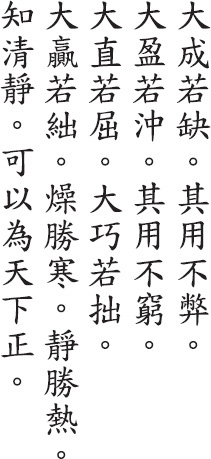45
 |
Perfectly complete it seems deficient yet it never wears out perfectly full it seems empty yet it never runs dry perfectly straight it seems crooked perfectly clever it seems clumsy perfectly abundant it seems impoverished active it overcomes cold still it overcomes heat those who know how to be perfectly still are able to govern the world |
WU CH’ENG says, “To treat the complete as complete, the full as full, the straight as straight, and the clever as clever is mundane. To treat what seems deficient as complete, what seems empty as full, what seems crooked as straight, and what seems clumsy as clever, this is transcendent. This is the meaning of Lao-tzu’s entire book: opposites complement each other.”
LU NUNG-SHIH says, “What is most complete cannot be seen in its entirety, hence it seems deficient. What is fullest cannot be seen it its totality, hence it seems empty. What is straightest cannot be seen in its perfection, hence it seems crooked. What is cleverest cannot be seen in its brilliance, hence it seems clumsy.”
SU CH’E says, “The world considers what is not deficient as complete, hence complete includes worn out. It considers what is not empty as full, hence full includes exhausted. The wise, however, do not mind if what is most complete is deficient or what is fullest is empty. For what is most complete never wears out, and what is fullest never runs dry.”
HAN FEI says, “Ordinary people employ their spirit in activity. But activity means extravagance, and extravagance means wastefulness. Those who are wise employ their spirit in stillness. Stillness means moderation, and moderation means frugality.”
SUNG CH’ANG-HSING says, “We keep warm in winter by moving around. But sooner or later, we stop moving and become cold again. We keep cool in summer by sitting still. But sooner or later, we stop sitting still and become hot again. This is not the way of long life. This is how what is complete becomes deficient, what is full becomes empty, what is straight becomes crooked, and what is clever becomes clumsy. Those who seek balance should look for it in perfect stillness. Perfect stillness is the essence of the Tao. Those who achieve such balance are free from hot and cold.”
LI HSI-CHAI says, “Activity overcomes cold but cannot overcome heat. Stillness overcomes heat but cannot overcome cold. Perfect stillness or effortlessness doesn’t try to overcome anything, yet nothing in the world can overcome it. Thus is it said that perfect stillness can govern the world.”
CONFUCIUS says, “Those who govern with virtue are like the North Star, which remains in its place, while the myriad stars revolve around it” (Lunyu: 2.1).
In the Wangpi and Fuyi editions, line seven reads: “what is most eloquent seems dumb.” I have replaced this with the version introduced by Mawangtui B, with which the commentary of Yen Tsun agrees, and with which the Kuotien texts also seem to agree (reading ch’eng [success] as graphic shorthand for sheng [abundant]). Some commentators have wondered if lines eight and nine are not corrupt. Some, for example, have suggested “cold it overcomes heat / still it overcomes activity” would be more in keeping with Lao-tzu’s usage of these terms in verse 26. However, there is no support for such a variant among early texts, and I have accepted both lines as they stand. In line ten, I have gone along with the Fuyi text’s addition of chih (know how). And in the last line, I have followed Mawangtui A in adding k’o (able). Also in the last line, the Kuotien edition has ting (pacify) in place of cheng (govern), but no other text has this variant.